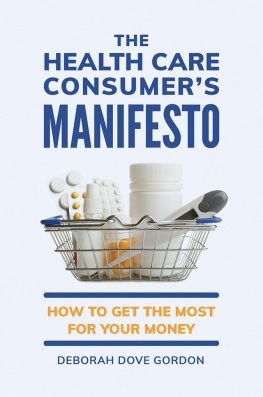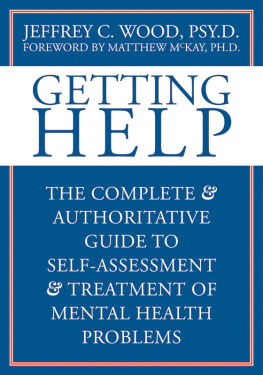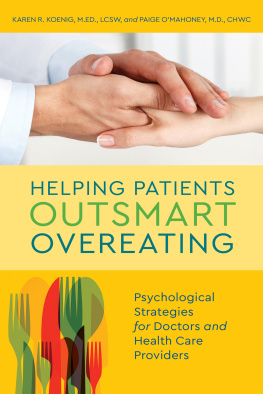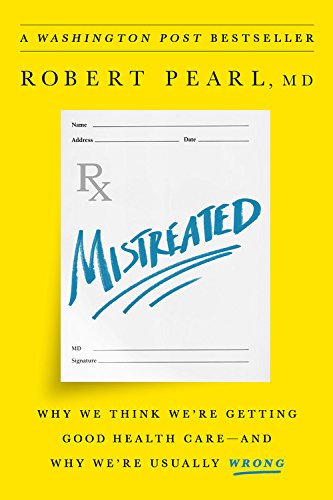Robert Pearl - Mistreated - Why We Think Were Getting Good Health Care and Why Were Usually Wrong
Here you can read online Robert Pearl - Mistreated - Why We Think Were Getting Good Health Care and Why Were Usually Wrong full text of the book (entire story) in english for free. Download pdf and epub, get meaning, cover and reviews about this ebook. year: 2017, publisher: PublicAffairs, genre: Home and family. Description of the work, (preface) as well as reviews are available. Best literature library LitArk.com created for fans of good reading and offers a wide selection of genres:
Romance novel
Science fiction
Adventure
Detective
Science
History
Home and family
Prose
Art
Politics
Computer
Non-fiction
Religion
Business
Children
Humor
Choose a favorite category and find really read worthwhile books. Enjoy immersion in the world of imagination, feel the emotions of the characters or learn something new for yourself, make an fascinating discovery.

- Book:Mistreated - Why We Think Were Getting Good Health Care and Why Were Usually Wrong
- Author:
- Publisher:PublicAffairs
- Genre:
- Year:2017
- Rating:3 / 5
- Favourites:Add to favourites
- Your mark:
Mistreated - Why We Think Were Getting Good Health Care and Why Were Usually Wrong: summary, description and annotation
We offer to read an annotation, description, summary or preface (depends on what the author of the book "Mistreated - Why We Think Were Getting Good Health Care and Why Were Usually Wrong" wrote himself). If you haven't found the necessary information about the book — write in the comments, we will try to find it.
The biggest problem in American health care is us
Do you know how to tell good health care from bad health care? Guess again. As patients, we wrongly assume the best care is dependent mainly on the newest medications, the most complex treatments, and the smartest doctors. But Americans look for health-care solutions in the wrong places. For example, hundreds of thousands of lives could be saved each year if doctors reduced common errors and maximized preventive medicine.
For Dr. Robert Pearl, these kinds of mistakes are a matter of professional importance, but also personal significance: he lost his own father due in part to poor communication and treatment planning by doctors. And consumers make costly mistakes too: we demand modern information technology from our banks, airlines, and retailers, but we passively accept last centurys technology in our health care.
Solving the challenges of health care starts with understanding these problems. Mistreated explains why subconscious misperceptions are so common in medicine, and shows how modifying the structure, technology, financing, and leadership of American health care could radically improve quality outcomes. This important book proves we can overcome our fears and faulty assumptions, and provides a roadmap for a better, healthier future.
Review
Mistreated is a powerful read, an incredible insight into American health care, a mix of poignant personal memoir by a son, the clinical perspective of an experienced surgeon, and the vision and understanding that comes from being the CEO of one of the largest and best health care organizations in the country. Robert Pearl is all those things, and with Mistreated he proves he is also a wonderful writer.
Abraham Verghese, MD, professor of medicine,
Stanford University, and author of Cutting for Stone
Robert Pearl argues that the troubles of the American health care system begin with a problem of perception: conceptual misunderstandings that warp priorities and distort choices. Mistreated is a brilliant and original analysis from one of medicines most insightful leaders. The doctor is in.Malcolm Gladwell, bestselling author of David and Goliath
Mistreated is a timely and necessary book on how to fix our broken health system from one of our most important voices in health care. Dr. Robert Pearls diagnosis isnt pretty. Morale in health care is low, costs are unmanageable, and health and survival are often worse than in other high-income countries. But Pearl is a leader who transformed his own health system to have very different results for patients and clinicians alike. And he offers that experience to show everyone the way.Atul Gawande, bestselling author of Being Mortal
Pundits like to speculate about the future of health care, but Dr. Robert Pearl has been busy creating it . . . at scale. As CEO of the nations largest medical group, he and his colleagues at Kaiser Permanente have created a system serving 10 million members that is low cost, but with nation-leading quality outcomes and high patient satisfaction. They havent just bent the cost curve, theyve wrestled it into submission. If you want to understand how to fix health care, listen to him: he knows.Chip Heath, coauthor of Switch and Decisive
Relying on his long history as one of the countrys most innovative and powerful physician-leaders, Dr. Robert Pearl lays bare the shortsightedness of the broken US health care system: why we resist better science, newer technology, and reform. He offers a vision of how to improve our medical care, informed and tested in his own real world practice.-Elisabeth Rosenthal, editor in chief of Kaiser Health News
Drawing on psychological research and his diverse roles as physician, business professor, and chief executive, Dr. Pearl diagnoses the problems of the American health care system and offers simple yet important solutions. In a health care system undergoing rapid changes, Mistreated is an essential and trusted guide to the future.Ezekiel J. Emanuel, author of Reinventing American Health Care
Mistreated is the honest conversation we need to have about the beautiful but broken craft of medicine.Marty Makary, MD, New York Times-bestselling author of Unaccountable
A respected expert gets personal. The result is a gripping drama set in our troubled health care system-and happily a roadmap for fixing it.Ceci Connolly, president and CEO of the Alliance of Community Health Plans
This is an important book. With clear and engaging examples, Mistreated reviews the fl aws in our traditional fragmented health care system, showing that context and perception matter more in health care than logic and data. This powerful insight can help our nation transform American medicine and make it the best in the world. A must-read for anyone who has ever been or will be a patient-and that is all of us.Alain Enthoven, professor emeritus, Graduate School of Business at Stanford
Mistreated provides a poignant and powerful portrait of what causes our health system to fail despite our best intentions. Starting with the painful story of his fathers untimely death due to medical error, Dr. Pearl honors his fathers memory by teaching us how to build a system that creates health and prevents harm.Ian Morrison, PhD, author, consultant, and futurist
Read more
About the Author
Robert Pearl, MD, is executive director and CEO of The Permanente Medical Group, responsible for the health care of 3.8 million Kaiser Permanente members, and he is the president and CEO of the Mid-Atlantic Permanente Medical Group. Selected by Modern Healthcare as one of the most powerful physician-leaders in the nation, Dr. Pearl keynotes around 15 events per year for audiences of up to 10K, hosted by organizations such as at the New England Journal of Medicine. He is on faculty at Stanford and has taught at Duke, UC Berkeley, and Harvard. His column on Forbes.com on the business and culture of health care includes articles, such as a conversation with Malcolm Gladwell, which received up to 500K views. Dr. Pearl has been featured in media outlets including Time, ABC News, USA Today, and NPR.
Robert Pearl: author's other books
Who wrote Mistreated - Why We Think Were Getting Good Health Care and Why Were Usually Wrong? Find out the surname, the name of the author of the book and a list of all author's works by series.






